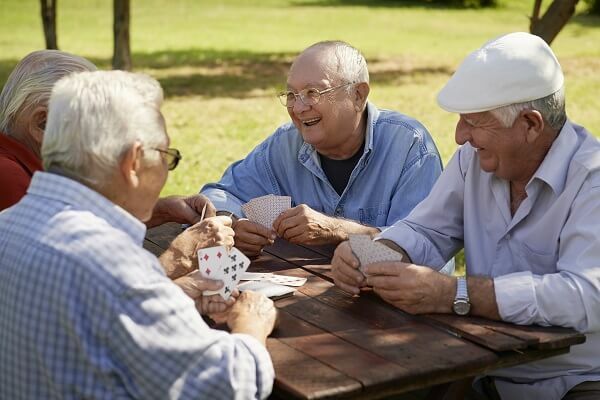 As Coronavirus (COVID-19) ravages its way across the world, and the United States in particular, it is imperative that we shelter in place and avoid outside contact as much as possible. Although implementing this new way of life is important for all age groups, it is especially crucial for senior citizens. According to the Center for Disease Control and Prevention, as reported by AARP, eight out of ten Coronavirus deaths reported in the U.S. have been in adults ages 65 and older (as of April 6th, 2020).
As Coronavirus (COVID-19) ravages its way across the world, and the United States in particular, it is imperative that we shelter in place and avoid outside contact as much as possible. Although implementing this new way of life is important for all age groups, it is especially crucial for senior citizens. According to the Center for Disease Control and Prevention, as reported by AARP, eight out of ten Coronavirus deaths reported in the U.S. have been in adults ages 65 and older (as of April 6th, 2020).
Although stay-at-home orders are now mandatory in nearly all states to prevent the spread of Coronavirus, social distancing is undoubtedly a double edge sword. Not only are seniors dealing with the uncertainty of a pandemic that disproportionately targets them, but often they are isolating themselves completely alone, robbed of the social interactions that make up the fabric of life. Studies suggest there is real danger in social isolation among the elderly. For example, a study by Rush University Medical Center in Chicago showed that loneliness may double the likelihood of dementia among older individuals.
Fortunately, there are numerous things that seniors can do to improve their mental health and raise their spirits during times of social isolation. Below are 6 mental health tips for seniors facing social isolation.
1. Envision A Better Tomorrow by Making a List
It’s completely normal to feel anxious, depressed and worried about the future. But how do you prohibit these thoughts from taking over and dominating your mindset? For socially isolated seniors, we recommend making a list of all the things that they’re going to do once this pandemic is over. Here are some list ideas we recommend:
List the Things that Bring you Joy in your Normal, Everyday Life
This could be a list of things you usually do in a given week, like going to the grocery store, taking a walk in the park, going to church, or visiting with friends and family. Write down all of these everyday experiences, and why you are looking forward to experiencing them again. These simple experiences don’t have to be the most glamorous possibilities imaginable. But if Coronavirus has taught us anything, it’s that these minor moments, the smile from the cashier at the hardware store, having lunch in your favorite restaurant, or watching the grandkids for an afternoon, are the most beautiful moments we’re lucky enough have in our lifetime.
List the Places you Always Wanted to Visit
There’s also nothing wrong with preparing some larger plans for when this pandemic finally blows over. Has there been a trip you’ve wanted to go on for years? Is there an experience you’ve been dreaming of, but never got around to doing? This might be the perfect time to put together a bucket list that you can start working on when the world returns to normalcy.
List the People You Want to See the Most
Nothing is more special than our interpersonal relationships. During socially isolation, seniors often spiral into a mindset that they will never see their friends, family, or loved ones ever again. Make a list of all the people you want to see. Write down why you love spending time with them, and how they make you feel. Take it one step further and jot down activities you want to do with each person when you finally see them.
2. Connect. Connect. Connect.
If you’re alone right now, it’s very important to reach out to your friends and family. If there’s been someone in your life you haven’t connected with in a long time then pick up the phone and reach out, because chances are they’re also at home right now longing for connection. If your family is busy working from home, it might be a good idea to schedule a call over the weekend. This will be something you can look forward to and will be a way to reconnect with your family, while maintaining a safe social distance.
We have access to an astounding array of technology that allows us to reach out to people around the world. While connecting digitally may never be as emotionally satisfying as talking to someone in person, it is a great way to stay in touch, especially with people who live far away. If you don’t have Facebook, it’s very easy to set up an account so you can connect with friends and family to share experiences and photos. Social networks are a great way to meet strangers who may share similar interests; it’s also a great way to branch out and make ‘digital’ friends.
If you have access to a computer or tablet at home, chances are it has a camera. You can download software like Zoom that allows you to have video calls for free. Being able to see the people you’re talking to is a wonderful way to connect on a more intimate level than traditional phone calls or text messages. It’s very easy to download this software and set up, plus there are tutorials online that are easy to follow. It’s important to be proactive about connecting with your friends and family. This will greatly improve your mental health.
3. Turn Off the News
When Ted Turner was originally approached by his employees to launch a 24-hour news network, later to become CNN, it was said that he scoffed at the idea. “There isn’t enough news to fill 24 hours,” Turner was reported to have said. He was right. If you watch or read the news the entire day then you’re just going to end up depressed, angry, and probably confused. It’s really been sad to see that a lot of the ‘news,’ has been nothing more than fearmongering and conjecture. Do yourself a favor and limit your news consumption to maybe 30 minutes in the morning and an hour in the evening. It’s important to stay informed, but being glued to the news all day is a surefire way to have a mental breakdown.
4. Stay Busy
Staying busy usually equates to having a purpose. Most socially isolated seniors are retired and already struggling to rediscover life’s purpose outside the worlds of work and children rearing. Here is a wonderful article and video we shot on how to stay happy and fulfilled in retirement. Below are several things we recommend to help stay busy and create daily purpose.
Deep Cleaning and Organizing your Home
This is the perfect time to do a deep cleaning of your entire home or your apartment. Maybe there have been small fixer-upper projects that you have been putting off; right now would be a great time to knock them out and stay busy. This may also be the perfect time to go through some of the stuff you’ve acquired over the years, and declutter. There’s bound to be a few things worth throwing in the garbage or putting in a bag for Goodwill. It will make you feel better to get rid of what you don’t need.
Find Household Giveaways you Can Make into Presents
You might also think about going through your house and finding things that you could gift to friends and family. Maybe there’s a necklace that would look great on your granddaughter or a watch that a grandson would appreciate; perhaps there’s a kitchen utensil that you never use but you have a friend who would really appreciate. It might be fun to plan to give away these items down the road.
Hobbies that You Love
There is no better time to try out new hobbies or return to an old passion, than when isolated at home. So often we try to force ourselves into doing the things we think we should do. We recommend tapping into the things you love to do, instead. How do you know you love a hobby? It’s when hours on end pass and it seems like it was just minutes, and you wake up the next day ready to do it all over again. Try learning a new musical instrument, painting or sketching, writing a book, photography, etc. You won’t know if you love something until you try it. And, most importantly, experiment with your hobbies guilt-free. If you don’t thoroughly enjoy one hobby, then try something else. You won’t regret it!
5. Daily Brain Games and Exercises
The cliché that the mind is like a muscle and requires exercise, is actually very accurate. Because social isolation can potentially be so detrimental to a senior’s brain, it’s important to turn off the TV and practice daily brain games. Reading at least 1 hour every day is very important. It doesn’t matter if it’s a history book, or Shakespeare, or a light, beach read. Plus, it will help you to transport your mind somewhere else for a bit, and there’s nothing better for that purpose than a book.
This is the perfect time to buy some jigsaw puzzles, because there’s a lot of evidence pointing to the benefits to mental acuity by working with puzzles. Additionally, if you practice meditation or are curious about starting, there are some excellent resources to help you find mental clarity. Other brain games you might enjoy include: Scrabble (online), sudoku, crossword puzzles, and even learning a new language.
6. Get a Pet
We saved this one for last because owning a pet simply is not for everyone. With that being said, owning a pet does two very important things for socially isolated seniors. One, pets provide a degree of companionship. Sure, they do not replace family and friends, but there is nothing like having a dog or cat curl up next to you to reciprocate love and affection.
Two, pets create a sense of responsibility and empathy in the person caring for them. They can give an extra purpose to life. You have to pet it, give it attention, clean up after it, and take your pet to the vet. If you own a dog then you’ll have to walk it, which will get you outside exercising and in the sunlight. Here is our list of some of the best dog breeds for seniors.
Article written by Treeline Content, LLC


Comments